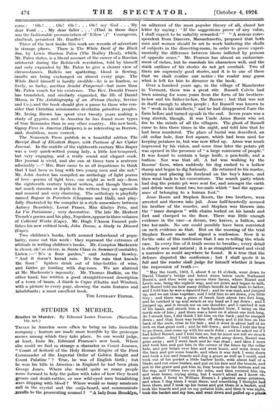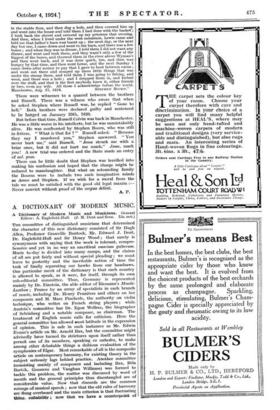STUDIES IN MURDER.
TRIALS in America seem often to bring us into incredible company ; horrors are made more horrible by the grotesque scenes among which they take place. So one would judge, at least, from Mr. Edmund Pearson's new book. Where else could we find so strange a character as Count Joannes, " Count of Sertorii of the Holy Roman Empire of the First Commander of the Imperial Order of Golden Knight and Count Palatine " ? True, he was of English birth ; but he won his title in America : in England he had been plain George Jones. Where else would quite so many people come forward to help the police with tales of how they heard groans and death-rattles, or saw wild-eyed men brandishing axes dripping with blood ? Where would so many amateurs call in the crystal and the ouija-board, and communicate =Sults to the prosecuting counsel ? "A Jadyfrom Brooklyn,
an adherent of the most popular theory of all, closed her letter by saying : If the suggestions prove of any value, I shall expect to be suitably rewarded.' " " A serious cone- spondent from Danvers, Massachusetts, proposed that both men and women should be set to work battering the skulls of subjects in the dissecting-room, in order to prove experi- mentally the difference between blows inflicted by persons of opposite sexes." Mr. Pearson has almost an embarrass- ment of riches, but he marshals his -characters well, and the stark outlines of his stories do not get overlaid. Two of them are supremely good stories, and it is to one of these that we shall confine our notice : the readet may guess what is left for him to discover in the book.
Over a hundred years ago, in the village of Manchester in Vermont, there was a great stir. Russell Colvin had been missing for some years from the farm of his brothers-
in-law and his father-in-law, the Booms ; but that was not in itself enough to alarm people ; for Russell was known to be " weak in his intellects," and he had disappeared from the farm before and turned up safe in the end. Seven years was a
long stretch, though. It was Uncle Amos Boom who set fire to the minds of all the villagers. The ghost of Russell came to him three times in the night, and told him that he had been murdered. The place of burial was described, an old cellar hole, four feet square, which had been used for keeping potatoes in, but was now filled up. Amos was much impressed by his vision, and some time later the potato pit was opened in the presence of " a large concourse of people."
It was found to contain a large knife, a pen-knife, and a button. Nor was that all. A lad was walking by the Booms' farm, when suddenly his dog rushed to a hollow stump and began to dig furiously. He returned to his master, whining and placing his forehead on the boy's knees, and then went back to his excavations. The search party which had dug the potato pit were sent for, and amongst the earth and debris were found two toe-nails which " had the appear- ance of belonging to a human foot" Jesse Boom and Stephen Boom, the two brothers, were arrested and thrown into jail. Jesse half-heartedly accused his brother of the murder, and Stephen was thrown into the " inner dungeon " with chains locked on his hands and feet and clamped to the floor. There was little enough evidence in the case—a dream, two knives, a button, and two toe-nails. No one could possibly have been convicted on such evidence as that. But on the morning of the trial Stephen Boom made and signed a confession. Now it is for the sake of this confession that I am re-telling the whole case. In every line of it truth seems to breathe ; every detail is clearly seen and natural ; it is as straightforward and vivid a narrative as could anywhere be found. It is true that the defence disputed the confession ; but I shall quote it in full and the reader shall judge for himself whether it bears the impression of truth :—
" May the tenth, 1812, I, about 9 or 10 o'clock, went down to David Glazier's bridge and fished down below uncle Nathaniel Boom's, and then went up across their farms, where Russel and Lewis was, being the nighest way, and set down and began to talk, and Russel told me how many dollars benefit he had been to father, and I told him he was a damned-fool ; and he was mad, and jumped up, and we sat close together, and I told him to set down, you little tory ; and there was a piece of beech limb about two feet long, and he catched it up and struck .at my head as I sat down ; and I jumped up, and it struck-me on one shoulder, and I catched it out of his hand, and struck him a back-handed blow, I being on the north side of him ; and there was a knot on it about one inch long. As I struck him, I did thinly I hit him on the back ; and he stooped down ; and that knot was broken off sharp and it hit him on the back of the neck, close in his hair ; and it went in about half of an inch on that great cord ; and he fell down ; and then I told the boy to go down, and come up with his uncle John ; and he asked me if I had killed Russel, and I told him no, but he must not tell we struck one another. And I told him when he got away down, Russel was gone away ; and I went back and he was dead ; and then I went and took him and put him in the corner of the fence by the cellar hole, and put briars over him and went home, and went down to the barn and got some boards, and when it was dark I went down and took a hoe and boards and dug a grave as well as I could, and took out of his pocket a little barlow knife, with about half of a blade, and cut some bushes, and put on his face and the boards, and put in the grave and put him in, four boards on the bottom and on the top, and t'other two on the sides, and then covered him up, and went home, crying along, but I warn't afraid as I know on. And when I lived to William Boom's I planted some potatoes, and when I dug them I went there, and something I thought had been there, and I took up his hones and put them in a basket, and took the boards and put on my potatoe hole, and then it was night, took the basket and my boo, and went down and pulled up a plank,. in the stable floor, and then dug a hole, and then covered him up and went into the house and told them I had done with the basket - I took back the shovel and covered up my potatoes that evening. And then, when I lived under the west mountain, Lewis came and told me that father's barn was burnt up ; the next day, or the next day but one, I came down and went to the barn, and there was a few bones ; and when they was to dinner, I told them I did not want any dinner, and went and took them, and they warn't only a few of the biggest of the bones, and throwed them in the river above Wyman's and then went back, and it was done quick, too, and then was hungry by that time, and then went home, and the next Sunday I came down after money to pay that I gave to boot between oxens ; and went out there and scraped up them little things that was under the stump there, and told them I was going to fishing, and went, and there was a hole ; and I dropped them in, and kicked over the stuff, and that is the first anybody knew it, either friends or foes, even my wife. All these I acknowledge before the world.
Manchester, Aug. 27, 1819. STEPHEN Boonx."
There were witnesses to a quarrel between the brothers and Russell. There was a witness who swore that when he asked Stephen where Russell was, he replied " Gone to hell." Both brothers were declared guilty and sentenced to be hanged on January 20th, 1820.
But before that time, Russell Colvin was back in Manchester. He was a little worse in his intellects, but he was unmistakably alive. He was confronted by Stephen Boorn, who was still in fetters. " What is that for ? " Russell asked. " Because
they say I murdered you," Stephen answered. " You never hurt me," said Russell. " Jesse struck me with a briar once, but it did not hurt me much." Jesse, mark you! A new trial was ordered and the State made an entry of nol. pros.
There can be little doubt that Stephen was terrified into making his confession and hoped that the charge might be reduced to manslaughter. But what. an astounding family the Booms were to include two such imaginative minds as Amos and Stephen. If we wish for a moral from the tale we must be satisfied with the good old legal maxim :-
Never convict without proof of the corpus delicti. A. P.



















































 Previous page
Previous page